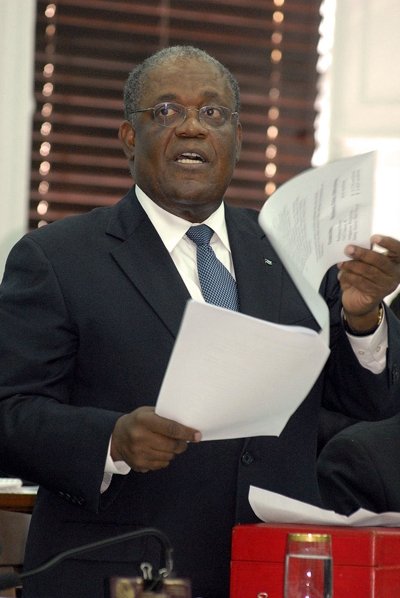 LISTEN NOW – Prime Minister Ingraham’s Contribution
LISTEN NOW – Prime Minister Ingraham’s Contribution
Contribution to debate on the Communications Bill 2009 by Prime Minister the Rt. Hon. Hubert Ingraham:
THE PRIME MINISTER: Mr. Speaker,
It is my privilege to move for the second reading of the Communications Bill 2009. The Bill deals with all matters relating to the regulation of radios, television, cable, fixed telephone lines, mobile or cellular telephones and Internet services.
The Bill is a step in the direction of eliminating monopolies in The Bahamas in respect of the provision of these services. As you know, telecommunications has been provided by BATELCO, now BTC, from the beginning of time and it has had a monopoly on the provision of those services up to and including the 1990s when we began to liberalise the communications sector and permitted others to begin to enter that sector.
The monopoly of BTC will come to an end at some point in time over the next two-plus years insofar as mobile services is concerned. But insofar as the other services are concerned, there are different times and periods as is evident from the introduction of Cable services to The Bahamas and the licensing of another company to carry out fixed line telephonic operations.
Mr. Speaker,
Back in the 1990s when we began to prepare BATELCO for the new era of communications in The Bahamas, we established a Public Utilities Commission. That Commission has served a useful purpose, but advances now suggest that that Commission is not in keeping with the evolved regulatory standards for communications and it is therefore proposed that a second Bill I shall move to repeal the law relating to the Public Utilities Commission and to put in place a more transparent arrangement.
It is rare that both sides of the House are agreed upon basic principles. But I think it is fair and accurate to say that firstly, both Members Opposite and ourselves are of the view that the communications sector in The Bahamas ought to be liberalised, that there ought to be competition in the sector and there ought not be one supplier of any service in The Bahamas dealing with communications.
We may differ as to how long it should take for there to be complete liberalisation, but we do not differ on the objective.
Secondly, I think it is also fair to say that both parties are of the view that BTC ought to be privatised. We may differ as to the extent of that ownership transfer and privatisation, but are all agreed that the Government should not be the exclusive owner and operator of this monopoly.
Mr. Speaker,
The Communications Bill before you has been drafted in very straightforward language easy to understand. I shall seek, rather than a lengthy speech, to go through the important provisions of the Bill so that we can have a public understanding of what we are seeking to do.
The Bills were produced for us by a Privatisation Committee that we appointed under the chairmanship of Mr. T. Baswell Donaldson and the Bills have been on the Government’s website, the Privatisation Committee’s website and I believe, the Ministry of Finance’s website for quite some time.
A good number of persons have responded to the Bills and have sent forward suggestions. We have advertised in the newspapers and issued news releases telling people and companies in The Bahamas where they can access the Bill and the responses have been fairly robust. Many of the suggestions made have been accepted and are included in the Bill.
In fact, there are a couple of suggestions that have now come forward subsequent to the introduction of the Bills in Parliament that will be considered by the Government and I expect that some amendments may be made to the Bill that we are debating today.
Mr. Speaker,
We seek to create certainty in the communications business and to have more than one supplier of communications in a relatively short period of time.
It is a reality that we are one of the few countries that only has one company from which you can buy cellular services. In virtually all of the other countries in our region, you have a choice. All monopolies are, generally speaking, not in the public’s interest even though government monopolies are less offensive than private monopolies.
This comes at a wonderful time because Cable Bahamas’ monopoly to supply Cable Services in The Bahamas comes to an end in October of this year, so that the opportunity would then be created for competition in that sector also.
As a result of this Bill we believe there will be encouragement for investment in the Sector, we will end up with a higher quality of service and that prices will go down.
I see Bahamians buying cell phone minutes from BTC and many times we have no idea how much money we are spending because the cost of it is high. If there is competition, competition will drive the cost down and everybody will benefit from it, but when you are the only supplier you are able to put forward your prices and inflict on the public this huge cost.
I saw in the newspapers the other day criticism that BTC was going to reduce the commission which it pays to persons who sell its phone cards. As far as I know that is not the case. But apart from that, nobody argued whether if that were so, would the savings be passed onto the consumer; the discussion was only about the persons selling the cards.
Mr. Speaker,
The liberalisation will also create new opportunities for many new participants and will also promote The Bahamas as a financial services centre and tourist destination with good communications.
When we did the Sector Policy some years ago, which was revised in October 2002, we outlined very clearly what the telecommunications sector policy would be and it is expected that when we do the new Sector Policy, similar things will happen.
The Bill before us sets out firstly, the policy for communications in Sections 4 of the Bill. The objective is to enhance the efficiency of the Bahamian electronic communications sector and therefore the productivity of the Bahamian economy, to promote investment and innovation in that sector, to encourage and promote sustainable competition among suppliers in that sector, and to obtain the maximum amount for State assets; i.e. assets of the Government and people of The Bahamas in the sale of such things.
It will also promote affordable access to high quality networks, impact significantly on public safety and security promote availability of a wide range of high quality content services.
Mr. Speaker,
One of the great advantages of The Bahamas is that basic telephonic service is now available in virtually every community in The Bahamas – that costs lots of money. But unlike many others who privatised their state telephone company, The Bahamas was able to ensure that before the privatisation took place, everywhere in The Bahamas had basic telephone services and it is therefore easier to impose an obligation on anyone who goes into the business that this must be maintained if not enhanced.
That also presents a challenge for us with respect to Cable Bahamas. [Reads Schedule 5 of the Bill]. These are communities in The Bahamas that do not now have cable service. We are going to revisit this section which lists the places as Sweetings and Water Cay, East End Grand Bahama; Grand Cay; Guana Cay, Abaco; Moores Island; Central and South Andros and Mangrove Cay; Southern Eleuthera, Current and Current Island (?); West and East Exuma and the Cays (Staniel Cay, Black Point and Farmer’s Cay); Cat Island, Rum Cay; North and South Long Island; Ragged Island, Crooked Island, Acklins and Long Cay and Mayaguana.
When we licensed Cable Bahamas to provide cable services in The Bahamas, it was agreed that 90 percent of the population would have access to cable services. That left out a number of communities that would make up the 10 percent because when you take the percentum of population in The Bahamas, taking New Providence, Grand Bahama, Abaco and Eleuthera out of the equation, you will see what you are left with in terms of the total percentum of householders or population of The Bahamas.
And so we have got to find the means now by which we can ensure that the remaining portions of The Bahamas has access not only to the basic telephonic service but to the basic cable service as we go forward with this communication policy. The Section in the Bill here now does not adequately address that issue, and so an amendment will be moved in Committee dealing with that question. It may not be possible to guarantee that every single community will have access to basic cable service, but to the extent that it is, we are going to see to ensure that we cause to be maximised, the number of communities that have access to it.
And certainly that 10 percent can be reduced considerably to an irreducible minimum because we also have in New Providence, Grand Bahama, parts of Abaco and parts of Eleuthera, pockets where they do not have access to this basic service.
I never forget the elderly lady in my constituency who said to me that it cannot be right that she must pay $30 out of her pension in order to watch ZNS and that is the only thing she wants to watch on TV.
We may not be able to do for cable services what we are doing for telephone services where we are saying any community that has more than 10 or more households [must have service].
Mr. Speaker,
I want to move to the licensing of the electronic communications sector and the exemptions, etc. The spectrum is the actual license that is going to be granted to the various entities when the privatisation of BTC takes place hopefully not long from now and there is opportunity or need to license additional mobile service providers.
As Members would know, the intention is that immediately upon the privatisation of BTC, fixed line telephone operation will be liberalised; meaning that other persons can enter the sector. And within two years after that persons will be able to go into the mobile service operation.
There is a fine line between doing what you know must be done and on the other hand, seeking as best you can, to preserve as much of the public value in BTC as is humanly possible.
These are not the best of times to be dealing with privatisation, but we have been on this road now for more than 10 years and this time we propose to bring it to a successful conclusion.
There are some minor amendments that need to be made to the Bill for Members in terms of Sections and references upon further editorial checks. Sections will change for instance: Section 5 will become Section 4 and that will have consequential amendments down the line we will make available to Members an actual red-lined copy to show the difference in the various Sections.
So the Bill deals with the licensing of persons in the sector, and the management of the SMP and Universal Service. Universal Service will require the provision of the basic telephone service to all populated areas [i.e. 10 houses or more], affordable dialup internet services, basic internet services, affordable public access to pay apparatus and affordable basic television services to designated communities in The Bahamas.
The Bill deals with consumer protection, public service broadcast, and contains anti-competitive provisions.
Mr. Speaker,
One of the issues that comes up from time to time, is the extent to which you ought to allow, by arrangements between various entities, agreements – the effect of which is for a monopoly or a dominant position to be had by one enterprise. The idea is to ensure that the public has a broad spectrum of ability to be able to obtain information and that it is not all contained in one or two hands, whether they be that of the Government or the private sector.
So the Bill contains the ability for URCA to be able to deal with these anti-competitive arrangements that exist in the broadcast sector.
Mr. Speaker,
Members of the Opposition had the opportunity to hear a presentation from the Privatisation Committee last Friday, and I did undertake to the Member of Yamacraw that when I spoke this morning, I would say that she asked why the Government was going to be disposing of 51 percent of BTC.
This is not the debate about the sale of BTC; that is a separate debate that will come. But the reality is that the Government owns 20 percent of Cable Bahamas and on privatisation of BTC, the Government will also own 49 percent of BTC so the Government’s interests in the communications sector, which the public interest in the sector, is adequately dealt with.
And one day, it is my expectation that the Government will divest itself of much of its 49 percent directly to Bahamian owners and thereby reduce its own holdings so that we will empower far more Bahamians than exists today. That is how we did the Bank of The Bahamas divestment by the Government and that is how I expect we will do the divestment by BTC.
I so move.








@kevin mckenzie
thanks kevin,
we need more people like you. i dont think we will get more than 20 replies. but mark my words, when the rates go up.. then we will see the outcry……
I have been preaching this for the last two years, first HAI & FMN was not given any mandate by the Bahamian people to sell anything. The PLP is not innocent either, because they saw the need to do the same thing. We as a people need to get up of our asses, stop watching American idol and look and see what’s happening in this country. This government is looking out for the very rich and special interest groups, and they can care less about the small man. I would like to ask all readers to do some homework. Do a google search or privatization of telecoms , lessons learn. We need to establish a mailing list and email our politicians, let them know that enough is enough. If Batelco is allowed to privatized, there will be hell to pay. We cannot afford to continue selling our birth right for small gains. We have yet to have a referendum on the privatization of all our public utilities.
If the government needs to privatize BTC or any other Utility there are various stages privatization can take, and many forms, but equally many interest groups to lobby for and against. The principal stakeholders on the supply side are government and the employees, where government can be motivated by different considerations such as raising funds from an IPO or promoting structural reform and investment in telecommunications, and employees by safeguarding jobs, salary structures, pension rights and other fringe benefits.
I have listed several references, I beg you to do some research, share ideas, opinions, defend what you believe in, it may be late for us, but not late for the children of this country. We can make a big difference.
References
Bortolotti, Bernard and Juliet D’Souza, Marcella Fantini, William L. Megginson (2002)
‘Privatization and the sources of performance improvement in the global
telecommunications industry’ Telecommunications Policy, v.26.n5/6, pp. 243-268
Boubakri, Narjess and Jean-Claud Cosset (2000) ‘The Aftermarket Performance of
Privatization Offerings in Developing Countries’, Working Paper. Montreal: Ecole des
HEC. url: http://www.crefa.ecn.ulaval.ca/cahier/0016.pdf
Boylaud, Olivier and Giuseppe Nicoletti (2000) ‘Regulation, Market Structure and
Performance in Telecommunications’ Economics Department Working Papers No.237,
OECD, Paris. url: http://www.oecd.org/dataoecd/13/26/1884238.pdf
Doove, Samantha and Owen Gabbitas, Duc Nguyen-Hong, Joe Owen (2001) Price
Effects of Regulation: International Air Passenger Transport, Telecommunications and
Electricity Supply’ Staff Research Paper, Productivity Commission, Commonwealth of
Australia. url: http://www.pc.gov.au/research/staffres/peor/poer.pdf
Duwadi, Kiran (2003) ‘Telecommunications Investment, Economic Growth and
Universal Service in a Global Economy’ International Bureau, Federal Communications
Commission, Washington, D.C. url:
http://hraunfoss.fcc.gov/edocs_public/attachmatch/DOC-233246A1.pdf
Kevin mckenzie, you are one of the few with common sense, I thought something was wrong with me for thinking like you. It is clear as day where we are headed. WE ARE SELLING OURSELVES INTO SLAVERY.
I am beginning to see why foreigners view Bahamians as less intelligent than donkeys.Lets look at Cable Bahamas,Philip Keeping,the Canadian who was awarded the 15 years cable monopoly intially invested one million dollars in this venture.All of the other funds were raised from Bahamian citizens,businesses and government corporations like BATELCO now known as BTC,BEC and National Insurance.Immediately after the initial public offer in which thirty million dollars was raise mr.Keeping send one million dollars to Canada.Some five years later mr.keeping sold some of his shares and got some forty million dollars.Mr.keeping sold more of his shares some two to three years ago to his fellow Canadian,mr.Braddock in which he got tens of millions of dollars.Now mr.Keeping is selling his remaining shares in Cable Bahamas for eighty million dollars!Please tell me who is the winner,mr.Keeping or the Bahamian people?Now the government is telling us Bahamians that BTC is too lucrative and technical for us to successfully own and manage.For those of you that argue the government needs the foreign currency,i would have you know that the amount of American dollars that will leave this country each year in profits being sent to the foreign owners home country will far exceed any initial cash infusion.Finally,yes sell BTC but sell it to Bahamians!
Comments are closed.